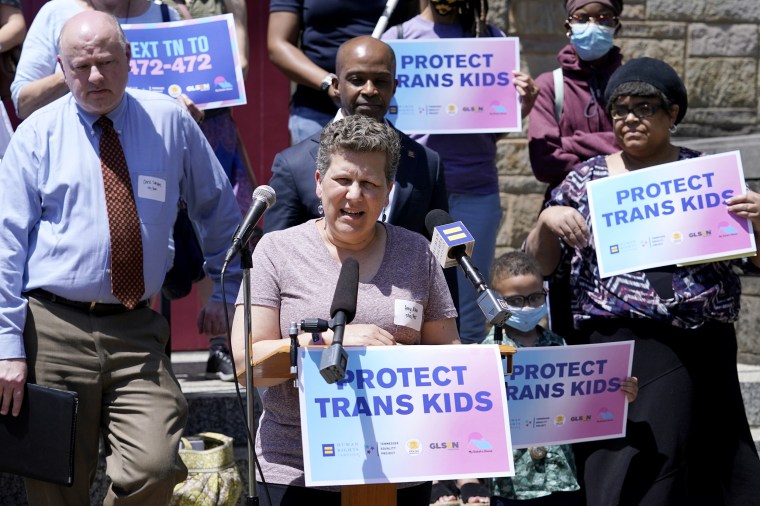The LGBTQ advocacy organization the Human Rights Campaign filed a lawsuit Tuesday on behalf of two transgender children over a Tennessee law that bars trans students and school staff from using public school restrooms that align with their gender identity.
The bill, signed in May by Gov. Bill Lee, a Republican, requires schools to provide a "reasonable accommodation" to students, faculty or staff who are "unwilling or unable" to use the public restroom or changing room that aligns with their birth sex.
It defines a “reasonable accommodation” as having access to a “single-occupancy restroom or changing facility” or “use of an employee restroom or changing facility.”

The Human Rights Campaign's lawsuit, filed in the District Court for the Middle District of Tennessee, argues that the law violates Title IX of the Education Amendments of 1972, which prohibits discrimination on the basis of sex in federally funded education programs. It also argues that it violates the equal protection and due process clauses of the U.S. Constitution.
Tennessee Attorney General Herbert Slatery III, Director of Wilson County Schools Jeff Luttrell and Lee are named as defendants in the suit. They did not immediately respond to requests for comment.
After signing the law, which took effect July 1, Lee said it promotes "equality in bathrooms" and "provides equal access to every student."
"It’s a reasonable accommodation,” Lee told reporters at the time, according to The Associated Press. “It allows for accommodation for every student regardless of their gender. I think that’s a smart approach to the challenge.”
The two plaintiffs in the Human Rights Campaign's lawsuit are identified as A.S., 14, and A.B., 6; they are using only their initials to protect their privacy.
A.S. is afraid that the new law will make him repeat what he faced in seventh grade, when his school's policy barred him from using the boys' bathroom, according to the lawsuit.
The administration told him he could use the restroom in the nurse’s office, according to the Human Rights Campaign, but he said that using a “special” bathroom would have made him stand out and would have made his classmates wonder why he couldn’t use the same bathroom as other boys.
As a result, A.S. avoided drinking liquids at school altogether so that he wouldn’t have to go to the bathroom. His mom, Amy A., who is not using her full last name in the lawsuit to protect her family's privacy, told NBC News that the situation was "upsetting," because "nobody should have to do that just so they don't have to go to the bathroom."
“To the extent he needed to use the bathroom, he would delay while at school, and would run home from the bus stop as soon as school was over, or otherwise ask his mom to drive directly to the nearest public restroom if she picked him up to attend after-school activities, so that he could finally go to the bathroom," the lawsuit states.

In eighth grade, due to the Covid-19 pandemic, he transferred to a school that allowed him to use the boys' bathroom. This fall, though, he’s going to a public high school, and with Tennessee's law in effect, he'll be barred from using the boys' bathroom again.
“It stresses me out that I’ll have to deal with this all over again at my new school,” A.S. said in a statement.
The other plaintiff, 6-year-old A.B., began her social transition at 4 years old, but she won't be able to use the girls' restroom when she starts first grade in the fall.
Her mom, Julie B., said that A.B. doesn't fully understand the law, but that when she asked her daughter how she would feel if she had to use the boys' bathroom, she said, "Well, that would just be really weird because I’m a girl."
"All she can remember is that she's always used the girls' at the private school she attended for kindergarten, and she's also on a girls' gymnastics team."
Julie B. agreed with her daughter that it would be weird for her to use the boys' bathroom "because she looks like a little girl," she said. "It honestly would cause a lot more problems and more confusion to see her in a boys' bathroom."
"It's just absolutely ridiculous that we're even having to do this for bathroom usage, and just the fact that our state leaders are targeting our children for being their authentic selves when there's so many other issues that they really should be focusing on," she said. The law "makes me afraid for her being here. They're making it a dangerous place to essentially say that my child is different from everyone and therefore essentially should be segregated."
Both Julie B. and Amy A. said they are considering moving out of Tennessee if the law isn't blocked. They both noted that Tennessee has recently passed other laws targeting transgender people as well.
"It’s something that is at the forefront of our minds right now, because we don’t want our son to have to live in a place where he feels like he isn’t welcomed and valued," Amy A. told NBC News. "I was never more aware than I am now [of] the differences from state to state when it comes to laws that protect LGBTQ people. Had we known before we moved here that he was trans, we would have been aware then, and we wouldn’t have moved here."
Though the law provides a way for trans students and faculty to avoid using a bathroom that does not align with their gender identity — such as using a single-occupancy teacher's or nurse's restroom — advocates point to cases like A.S.’s to show that having to use a separate restroom singles out trans children. Often, these separate restrooms are far from the students' classes and can lead them to avoid using the restroom entirely out of fear that they could be ostracized or subjected to bullying, advocates say.
Where the federal government stands
So far, in similar cases, courts have sided with transgender students. HRC's lawsuit cites the 4th U.S. Circuit Court of Appeals decision in Grimm v. Gloucester County School Board, a case that began in 2015 when a trans high school student, Gavin Grimm, sued his school board after it wouldn’t allow him to use the boys' restroom.
The court found that policies barring transgender students from restrooms that match their gender identity violate the equal protection clause and Title IX. The U.S. Supreme Court this month declined to review the case, leaving in place the circuit court’s decision.
HRC also noted that the federal government has recently said that policies targeting transgender children — by preventing them from accessing single-sex facilities or school sports teams that align with their gender — violate Title IX.
The Justice Department issued a memorandum in March stating that Title IX protects LGBTQ students from discrimination based on sexual orientation and gender identity. The Department of Education echoed the same sentiment in a federal notice issued in June.
The Department of Justice also filed a statement of interest in a lawsuit filed by the American Civil Liberties Union challenging a West Virginia law that bans transgender student athletes from competing on school sports teams that align with their gender. The department is arguing that the law violates the equal protection clause of the 14th Amendment and Title IX.
Though the federal government and courts have supported the rights of transgender students, Tennessee and more than two dozen other states have continued to consider and pass laws that target either their bathroom use or their participation in sports.
Alphonso David, president of the Human Rights Campaign, said conservative lawmakers are persisting with such legislation despite the near-guarantee of lawsuits "for one simple reason: They believe that they can gain political advantages by targeting vulnerable transgender young people," he told NBC News.
"What the Tennessee governor and lawmakers have done here is reprehensible," David said. "They're effectively trying to erase transgender young people for political gain. They want to deny the fact that trans and nonbinary people exist."
Families "shouldn't be forced to consider moving out of certain states in order to protect their loved ones," he added. "So we're going to fight in court to make sure that their rights are protected."
Rodrigo Heng-Lehtinen, executive director of the National Center for Transgender Equality, said trans students, "like all students, deserve an educational environment that is safe, supportive and free from discrimination."
"Singling transgender young people out and excluding them from such simple, everyday things like the regular restroom puts a target on their back," he said. "It ostracizes them. Schools should be encouraging youth, not bullying them.”
David said that contrary to what conservative lawmakers believe, recent polls have found that a majority of Americans oppose bills that limit trans rights. For example, a PBS NewsHour/NPR/Marist poll released in April found that two-thirds of Americans oppose such laws.
He said he hopes the lawsuit sends a message to transgender and nonbinary young people that "there's a community here to fight for you."
"They exist, their legal rights need to be respected, and we're here to make sure that they do," David said.
